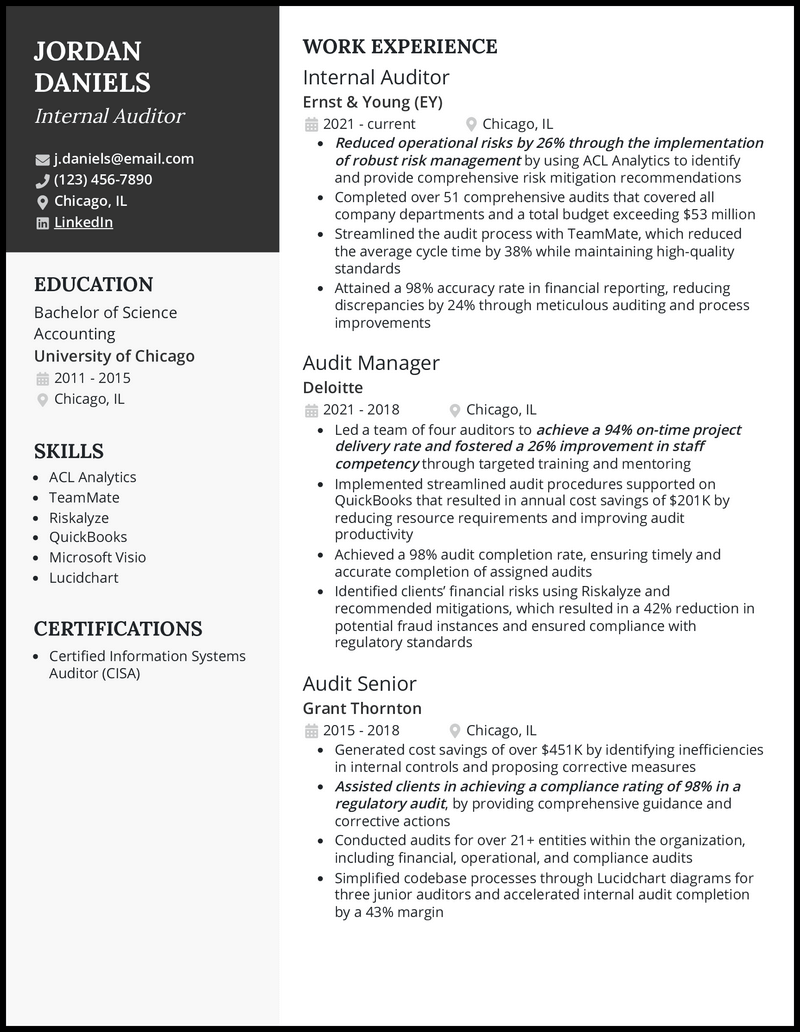Every company needs experts who can keep processes on track. That’s where you come in to review financial records and perform risk assessments to ensure success.
Have you thoroughly reviewed your resume to ensure it’s optimized? What about writing a great cover letter?
Since your analysis will have a vital impact on a company’s compliance standards, it’ll be essential to include the right job skills and work experience. We’ll help you optimize yours with our internal auditor resume examples based on what’s working in today’s job market.
Related resume examples
What Matters Most: Your Internal Auditor Skills & Work Experience

Internal auditors need a variety of professional skills, from knowledge of GAAP standards to understanding process improvement measures. It’s probably left you wondering how to fit all this crucial information on a one-page resume.
The job description will help you narrow down based on each company’s needs. For example, one company may need assistance with budget management, whereas another will require you to run risk-management assessments.
Here are some popular internal auditor skills to get you started.
9 popular internal auditor skills
- Sage 50
- SAP Crystal
- Tableau
- Risk Assessments
- Financial Analysis
- Tally ERP
- Fraud Investigations
- QuickBooks
- SOX 404
Sample internal auditor work experience bullet points
Your skills in risk assessments and Sage 50 will get you off to a great start. However, hiring managers will still want to see the results you’ve achieved previously.
When crafting work experience bullet points, remember to list more than just job duties like “in charge of financial analysis.” Instead, making them actionable achievements will work better, such as “performed financial analysis to identify 18 material costs that could be reduced, saving $35,000 in the production process.”
Each example should be concise for easy review, just like you would do when creating a financial analysis report that you’d deliver to company decision-makers.
Here are a few samples:
- Implemented ACL analytics into risk management processes to identify and reduce 54% more operational errors.
- Created Tableau dashboards with essential financial data to make spending and cost-cutting decisions 68% more efficient.
- Integrated Sage 50 into payroll processes to reduce FLSA compliance errors in record-keeping by 49%.
- Streamlined auditing procedures using QuickBooks, reducing the time spent on each audit by 27 hours and saving $25,000 in associated yearly costs.
Top 5 Tips for Your Internal Auditor Resume
- Always measure your impact
- You know the importance of data in financial and performance metrics. Use that to your advantage in your resume by always including a measurable impact in each example, such as how you boosted policy adherence rates or accuracy during record keeping.
- Focus on technical skills
- Internal audits are a highly technical process, with GAAP and FLSA compliance being crucial to account for. Therefore, focusing more on technical skills throughout your resume, like using Sage 50 or SAP Crystal, will help you optimize for success.
- Keep it organized
- Just as financial data wouldn’t be meaningful if compiled on a disorganized Excel spreadsheet, a resume that doesn’t flow well will also lose a hiring manager’s attention. You can organize yours better by ensuring it’s well-spaced, has clear headers, and uses bullet points with top internal auditing skills and experiences.
- Write in an active voice
- Using an active voice in your examples will make them more engaging. You can do that effectively using active verbs like “performed” or “reviewed.” For instance, you could say you “performed 52 financial audits, identifying 11 inaccuracies that boosted GAAP compliance by 38%.”
- Proofread before submitting
- Internal auditors must always be prepared to catch fine details like reports that weren’t processed right or spending that wasn’t documented. An easy way to present your accurate skill set to hiring managers is proofreading to ensure your resume is free of grammatical errors.
You’ll want to keep your internal auditor resume on a single page. Make sure everything you include is brief and highly relevant to company needs, such as focusing on performing financial analysis in QuickBooks for a company that wants to boost financial compliance with industry standards.
Many internal auditing roles require a bachelor’s degree in accounting or related fields, so listing any relevant education is a good idea. It’ll help present your well-rounded skill set in financial compliance and risk assessments.
Reverse chronological formatting will work best. As you’ve grown in your career, your knowledge of aspects like SOX 404 systems and fraud investigations will have improved quite a bit. So, listing your most recent experiences first will help emphasize relevant abilities to hiring managers.








